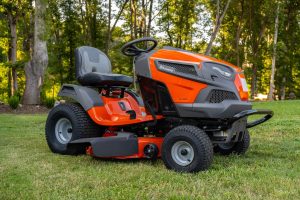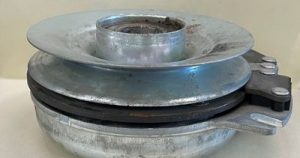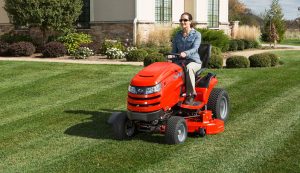12 Reasons Your Snapper Lawn Mower Cuts Uneven
You finish mowing your lawn and stop to admire it. That’s when you notice your lawn looks terrible. Your Snapper lawn mower is no longer providing you with a good cut and you’re not sure why. I have put together a list of items to check on your mower.
A Snapper lawn mower will cut uneven when it has a low tire pressure; a worn, bent, or unbalanced mower blade; bad bearing in the spindle or pulley; a worn belt; or plugged mower deck. A Snapper mower can also cut uneven when it doesn’t have enough engine power.
Before checking your Snapper for an uneven cut, prepare your mower by parking it on a flat level surface and setting the parking brake. Take safety precautions to prevent your mower from starting.
This includes removing the ignition key and unplugging the spark plug wires. Use appropriate safety items to protect your hands and eyes from sharp edges and debris.

This post may include affiliate links. Purchases made through these links may provide a commission for us, at no extra cost to you. As an Amazon Associate, we earn from qualifying purchases.
Follow all safety instructions provided in your equipment operator’s manual prior to diagnosing, repairing, or operating.Consult a professional if you don’t have the skills, or knowledge or are not in the condition to perform the repair safely.
Table of Contents
Reasons Your Snapper Mower is Cutting Uneven
Low Tire Pressure on Your Snapper Mower
Before checking anything on your Snapper mower, check your tire pressures. Your bad and uneven cut can be something as simple as a low tire. Having a low tire will throw off the level of the deck making it sit lower on the side with the low tire.
Use a tire pressure gauge and check your tire pressure. The pressure reading should match the recommended tire pressure shown on the tire sidewall. Add air to a low tire until the pressure is corrected.
Worn or Dull Snapper Mower Blades
Your blade tips can become so worn that a strip of grass is left between them when they turn under your mower deck. The sail on your blade can also become very worn. When this happens, your blade is not able to create the air movement and suction under the deck required for a good cut.
Wearing a mower blade is not something you can avoid. This happens under normal conditions from the blade’s exposure to sand. The airflow and suction your blades create to lift the grass also draw in a lot of dirt. This dirt can wear your blade and create a dull edge.
Check your mower blades for wear. When the blade tips become rounded or the sail of the blade is thinner than the center of the blade, you must replace your blade.
If your Snapper blades are in good condition, but the edges are dull. Remove your blades and replace them.
Bent Snapper Mower Blade
A mower blade can become bent when it contacts a solid object. Mower blades spinning at high rates impacting an object can tweak the blade or bend it. There are a couple of ways you can check for a bent blade on and off your mower.
Before you remove a mower blade, it is a good idea to quickly check the condition of the spindle and bearing. Refer to the section on the spindle housing below.
Check for a bent blade with the blade on your Snapper mower
With your mower parked on a flat level surface. Measure the blade end from the ground to the blade. Record the measurement. Rotate the blade 180 degrees and measure from the same spot on the ground to the blade end. Record the measurement.
If you find your mower blade has more than a 1/8” difference between the two measurements, your blade is bent and should not be reused.
Check for a bent blade with the blade off your Snapper mower
For this step, have a good blade you can compare each used blade against. Place the used blade on top of your good blade and look for gaps or a bend in the blade that shouldn’t be there. Do not reuse a blade that does not sit flat against the good blade.
Never attempt to straighten a bent mower blade. Doing so will compromise the metal making it more likely to weaken and crack. There will be a risk of the blade breaking off at high speeds which can pose a danger to people, pets, or structures in the area.
Unbalanced Snapper Mower Blade
An unbalanced blade is one where one side of the blade is heavier than the other. This can happen from uneven wearing or during the sharpening process when more metal is removed from one side of the blade.
An unbalanced blade can cause your blade to wobble when it rotates under the mower deck. At very high speeds, the blade can cause spindle bearing damage. A significant vibration will be sent through your Snapper mower.
Use a blade balancer. It’s a handy inexpensive tool to check the balance of your Snapper mower blade before you install it.
If you don’t have one of these tools, you can hang your blade on a nail in the wall. Shave metal off the heavy side of the blade until it remains level on the nail.
Snapper Mower has a Damaged Spindle or Bad Spindle Bearing
A damaged spindle or bad bearing can cause movement in your blade when it rotates under the deck. This can cause a significant vibration and an uneven cut.
With your mower blade installed, grab each end of the blade. Rock it up and down to check for any movement or knocking sound.
When you feel movement or hear this sound, your bearing is most likely bad. Remove your mower blade and spindle housing to check for bearing or spindle damage. Replace any damaged parts.
Plugged Mower Deck on Your Snapper Lawn Mower
Snapper lawn mowers use the air movement of the blades along with the deck shell and baffles to create a suction to lift your grass and allow the blade to make a precise even cut.
A plugged deck full of debris, dirt, and grass clippings reduces the area available to create good airflow and suction.
Not only will this cause your mower to give an uneven cut, but it will also cause your Snapper’s engine to work harder to turn the blade through the debris. Keep your mower deck clean and free of debris.
Scrape the deck regularly to prevent excessive buildup. To minimize buildup under the deck, avoid mowing in wet conditions. Wet grass will clump and stick to your deck.
Snapper Mower Deck is Not Level
A deck that is not level can give you an uneven cut. When one side of your deck sits lower than the other, the mower may give you a stair-step kind of cut.
Because adjustment procedures for leveling your Snapper mower deck vary by model, refer to your operator’s manual for leveling procedures.
Makes sure your deck is level from side-to-side and front-to-rear. Note: on some deck models, the front of the deck sits slightly lower than the rear. Again, refer to your owner’s manual for the exact specifications for your Snapper mower deck.
Bad Snapper Deck Belt or Pulleys
A worn snapper belt will fail to grip your pulleys and rotate your mower blades at the high speeds required for a good cut.
You can tell your belt is worn when it has a shiny glazed appearance; it no longer sits tight to the pulleys; it sits deep in the pulleys, or there are cracks in the belt. Replace a worn belt with a new belt.
The bearings in your pulleys on the snapper mower can become bad. This can cause your pulleys to not sit flat and securely on the deck. There may be some vertical movement in the pulley causing one side of the pulley to sit higher off the deck than the other side.
To check for a bad pulley bearing, slowly spin each pulley by hand. Feel for a restriction and listen for bearing noise. When you experience either of these symptoms or a wobbling, replace your pulley.
Snapper Mower’s Engine Speed is Too Low
When you engage your mower deck, you must have your Snapper mower running at full throttle. You need the engine speed to be at its highest to be able to send enough power to the mower deck to spin your blades and give your lawn a good cut.
You may be running your Snapper mower and realize your engine is no longer giving you the power required to cut your lawn.
If this is happening to you, have a small engine mechanic check and perform tests on your engine to identify any potential problems causing your engine to not give the power you need.
Moving Your Snapper Mower at Fast Speeds
Your engine can get overloaded when mowing at fast speeds causing your Snapper mower to give you a bad cut. Just like I mentioned above, an engine that doesn’t give you enough power can result in a bad mower cut.
Know your mowing conditions and adjust your speeds accordingly to not bog down your engine. When mowing tall, wet or thick grass, you must operate at slower speeds.
Additionally, slow down when operating on inclines. Mowing at too fast of speed can cause your mower to not cut all the grass or it ends up pushing the grass over instead of cutting it.
Incorrect Overlapping of Paths with Your Snapper Mower
Overlap your mowing paths to not leave strips of grass between each pass. If you have a new mower, this can take some time to get right.
You want to space your paths so you can save time and not keep mowing over the same section twice. It takes a little practice with your mower to get it just right.
Snapper Mower Deck is Damaged
If you accidentally run into a fence, tree, pole, or other items, you can damage the deck shell. This can give your mower an uneven cut if it is not corrected. If you are unable to fix your deck shell, you will have to replace it with a new shell.
If you need a deck shell replacement, I recommend contacting your Snapper mower dealership and getting a quote for a replacement deck shell along with the labor charge to swap all the components over to a new deck shell.
Compare this with a complete deck replacement. You may be surprised to find there isn’t a large price difference. With these two price quotes, you can make the right decision for you based on price and your Snapper mower’s condition.
Still Experiencing Problems with Your Snapper Lawn Mower?
Own a lawn mower long enough, you’ll start running into problems with it starting, not continuing to run, smoking, leaking gas, giving a bad cut, vibrating, or another issue.
To help you save time and money, I have put together a guide to help you troubleshoot the next problem that develops on your Snapper mower.
You can find this guide at Common Snapper Lawn Mower Problems & Solutions.
If you are unsure how to perform diagnostics and repairs on your lawn mower safely, it’s best to have a professional complete the repairs.
This will help you avoid personal injury or additional damage to the mower. Your local Snapper lawn mower dealership or lawn mower repair shop will be able to help you solve your problem.







